Prior Education Spotlights
Featuring UC Davis Health Faculty and Programs
The quality of the content that our well-qualified, expert clinicians produce is truly appreciated — and we're dedicated to highlighting those educators that go above and beyond to design unique educational programs. See how our educators are creating innovative learning opportunities.

Errors managing patients' seizures can be common. Healthcare staff fail to adequately implement seizure first-aid in patients actively seizing, or are delayed administering appropriate therapy. Clinicians at UC Davis Health discovered susceptibility to error and poor patient outcomes, so an approach was developed to increase consistent use of guidelines recommended by the American Epilepsy Society and the Neuro-Critical Care Society for acute seizure management.
UC Davis Health Neurologists Katherine Park, M.D., Kiran Kanth, M.D., Trishna Kantamneni, M.D. and Michael Chang, D.O. set out to improve patient care with active seizures by creating standardized guidelines and developing on-demand continuing medical education (CME). Acute Seizure Management targets physicians, nurses and pharmacists, with the goal of optimizing the interdisciplinary teamwork required to provide effective care for patients.
Q&A With Dr. Park and Dr. Kanth
Q: What makes this program unique?
A: The over-arching and comprehensive nature of this program makes it unique. So far, we have been able to implement a CME module, order-set, and dot-phrase for in-hospital documentation. This program seeks to not only educate providers about managing seizures, but also provides the tools to implement improved care via order sets and improved documentation and communication.
Q: How does this program seek to change medical practice?
A: Caring for someone who has a seizure can be frightening, even for the experienced care provider. We hope that through formal education about seizures and management of acute seizures in the hospital, care providers, whether residents, APPs, nurses or physicians, will feel more confident in providing the appropriate treatment. Appropriate and timely treatment of seizures can save lives and prevent poor hospital outcomes. We hope that quality measures such as time to treatment, transfer to the ICU, and length of hospital stay, will improve.
Q: What are the goals of this program?
A: We hope to educate nearly all levels of providers who provide bedside care to patients in the medical center. We also want to create an order-set that will be easily accessible and help providers order the correct treatments and seizure precautions. By creating a dot phrase, we want nurses and other providers to recognize the important features of seizures and of treating seizures, as well as to improve documentation and communication between providers. We also hope to eventually have in-person sessions for nurses and other providers on how to apply seizure first-aid through bedside seminars in a simulation lab. This would be similar to teaching providers to run cardiac arrest codes.
Q: If there is one takeaway you want learners to have from this program, what is it?
A: We want learners to be able to identify a seizure, be able to initiate seizure first-aid, and know when and what to give pharmacologically to terminate a seizure.
Q: Why is it important to have this program certified for continuing medical education?
A: The Office of Continuing Medical Education helped us to develop meaningful course content based on adult learning principles. Working with the Office of Continuing Medical Education and seeking CME certification ensured that from design through evaluation we created a course that achieved our key learning objectives, as well as ensured our education content was based on adult learning principles and aligned with national CME standards.
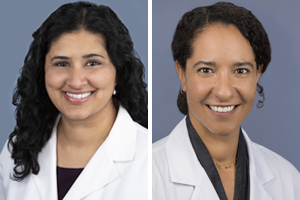
Healthcare professionals increasingly work in environments where diversity is celebrated, but systemic discrimination is often overlooked. While critical conversations addressing racism and systemic discrimination progress in professional organizations like the American Medical Association and the Centers for Disease Control, few guidelines currently exist to educate health care professionals on how to recognize warning signs and incorporate anti-racism in their practice.
Race and Medicine in Clinical Practice is a new Office of Continuing Medical Education course developed by experts Swati Rao, M.D. of the Department of Psychiatry and Behavioral Sciences and Micaela Godzich, M.D., M.S. of the Department of Family and Community Medicine. This innovative course assists learners in identifying race as a social construct, recognizing medical practices that contribute to the perpetuation of race-based stereotypes, and how to describe health inequities resulting from structural racism among minority groups.
"To really understand race, we need to understand what racism is," Dr. Rao says. When we think of racism, "we often think of intentionally racist acts, but unfortunately, intentionally racist acts are not by and large what causes the majority of health inequities."
The presence of systemic racism is known to have an effect in the production of illness, healthcare access and patient care. It is essential that healthcare professionals develop, longitudinally reinforce, and evaluate skills that combat racism and structural oppression in their practice. This course provides an essential first step in identifying and honing those skills.
Race and Medicine in Clinical Practice is certified for AMA PRA Category 1 CreditTM and is available on demand to all UC Davis Health professionals through the UC Learning Center.
Health professionals are confronted with pain and its management every day. However, pain management receives little attention in medical, nursing and other professional schools. The Train the Trainer: Primary Care Pain Management Fellowship directly addresses this education gap and seeks to change how pain is addressed by health providers and educators, as well as how to stem the tide of the opioid epidemic.
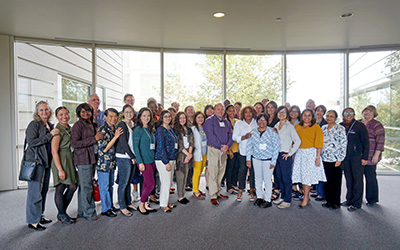
Course directors Scott Fishman, M.D. and David Copenhaver, M.D., M.P.H. designed this 10-month, virtual fellowship program with busy clinicians in mind. Participants continue to work in their practice while receiving training, mentorship and resources needed to become expert clinicians in primary care and pain management. Utilizing a train-the-trainer model, participants also learn how to educate their primary care colleagues on the latest practice methods.
Participants gain knowledge and skills to serve as a resource for safe opioid prescribing and pain management in their clinic. By training at least one trainer within each health center or system, the Train the Trainer: Primary Care Pain Management Fellowship expands the workforce of primary care providers with comprehensive pain management skills. By equipping providers with the tools to effectively and safely treat pain, the Train the Trainer Fellowship reduces less than optimal pain management and positively impacts the epidemic of prescription drug abuse.
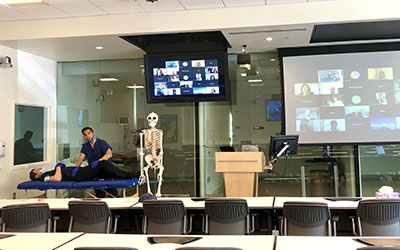
Upon completing the fellowship, participants reported feeling more confident and compassionate when caring for patients with pain. Past cohorts have demonstrated improved and sustained performance in pain competencies and increased recognition and understanding of pain and related topics.
Certifying this fellowship for CME credit ensures high quality educational opportunities based on best practices and evidence. Participants strengthen their comprehensive pain management skills through clinical-based learning, and supplement an essential topic in medical practice that may not have been covered through undergraduate medical education alone.
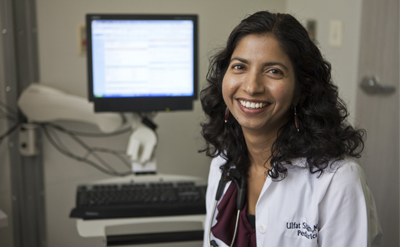
Launched in 2011, the UC Davis Annual Health Quality Forum seeks to improve population health through enhanced patient experiences and outcomes. The forum engages clinicians, trainees and students at UC Davis in lifelong learning and clinical quality improvement (QI). More than 300 clinicians, house staff, fellows and students at UC Davis Health participate in this event each year.
UC Davis Health physician Ulfat Shaikh, M.D., MPH, M.S., professor of pediatrics and director of health care quality, is one of the course chairs for the forum. In collaboration with the Office of Continuing Medical Education and course co-chair Frederick Meyers, M.D., professor of medicine and pathology and director of the Center for Precision Medicine and Data Science, Dr. Shaikh developed a program that highlights clinical practice improvement projects.
Q&A With Dr. Shaikh
Q: What makes the Annual UC Davis Health Quality Forum unique?
A: Since its inception, the Quality Forum has had an interprofessional focus and highlights the value of team-based care and collaboration in its selection of projects, topics and speakers. A special aspect of the Quality Forum is its role in highlighting our trainees’ participation in QI initiatives, through Graduate Medical Education High Value Competition awards funded by the UC Davis Health Office of Quality and Safety. Speakers and poster presenters are selected from abstracts submitted to the Quality Forum from all professional schools, programs and departments at UC Davis Health. At the time of its establishment, the UC Davis Health Quality Forum was well ahead of the curve locally, regionally and nationally in its emphasis on quality improvement in health care.
Q: How does this forum change from year to year?
A: The caliber of QI initiatives and the level of interprofessional work presented at the UC Davis Health Quality Forum has really evolved over the past decade. We integrated the use of the PechaKucha style of presentation into panel presentations at the event a couple of years ago. PechaKucha, Japanese for chit-chat, is a brisk presentation style that was developed in Tokyo as a way to share innovative concepts in a fast-paced format. Each six minute 40 second presentation consists of 20 slides for 20 seconds each. Slides in PechaKucha-style presentations run on automatic which ensures that presentations are compact and succinct, enhancing audience attention, knowledge retention, and the ability to accommodate multiple presenters within a short timeframe. Panel presentations are followed by a facilitated discussion that actively engages the audience. Participants report in their evaluations that they greatly enjoy this presentation style and that it keeps presentations "fresh," "engaging," and "memorable." The event culminates with a highly popular poster reception with approximately 60 posters presented each year by interprofessional teams of students, trainees and clinicians at UC Davis Health. The UC Davis Health Quality Forum is now streamed live on the Internet.
Q: If there's one takeaway you want people to have from this forum, what is it?
A: Over the past decade, we have witnessed the ability of the UC Davis Health Quality Forum to develop and strengthen an interprofessional community of clinicians at UC Davis Health who practice lifelong learning and continual improvement. For example, last year's Quality Forum represented projects conducted by dieticians, nurses, nurse practitioners, pharmacists, physicians, and physician assistants, as well as students and trainees in these professions. Topics highlighted included emergency department flow, diabetes care at federally qualified health centers, hospital-associated infections, and reducing waste and improving value in health care through team-based care. A key takeaway from the forum is the power of front-line clinicians to implement and lead system-level improvements in their own clinical settings, thereby making sure that patients at UC Davis Health receive the best care possible.
Q: Why is it important to have this forum certified for continuing medical education (CME) credit?
A: Research demonstrates that education is necessary but not sufficient to achieve excellence in clinical care. Lifelong learning must be accompanied by active participation in the process of improving our quality of care and the health of populations we serve. The UC Davis Annual Healthcare Quality Forum fosters interprofessional education and lifelong learning in clinical practice improvement, thereby building a culture of quality at UC Davis Health. Providing the ability to earn CME credits by attending the forum validates this link between education, practice improvement and clinical outcomes.
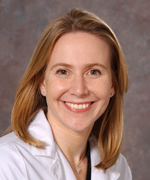
More than 2,000 Californians die each year from an opioid overdose, but a growing number of people are seeking medication-assisted treatment (MAT) for substance use disorders. MAT combines medications, such as buprenorphine, with counseling and is considered the most effective way to treat people with an opioid addiction.
UC Davis Health physician Aimee Moulin, M.D., associate professor and behavioral health director for the emergency medicine department, is at the forefront of the effort to empower both physicians and patients to seek assistance through MAT.
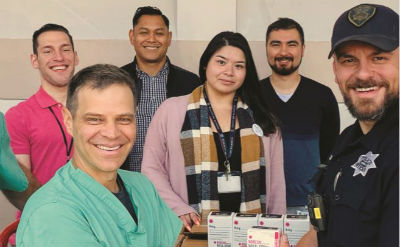
In collaboration with the Office of Continuing Medical Education, Dr. Moulin and the team of experts with California Bridge — a program of the Public Health Institute — developed a training program that helps transform hospitals and emergency rooms into primary access points for addiction treatment. The California Bridge Statewide Clinical Training program provides training and technical assistance to acute care providers to encourage patients to enter and remain in treatment, ultimately saving lives.
Q&A With Dr. Moulin
Q: What makes this training unique?
A: These training sessions are ultimately designed to engage participants to build programs to treat patients with substance use disorders. We focus on how to get a MAT program off the ground and break down barriers to low threshold rapid access to treatment for substance use disorders. The program is unique in that participants are able to network and share stories with clinical champions and substance use navigators from more than 52 hospitals participating statewide. Successes, pitfalls and program-wide data are shared to help each hospital and health care provider be as responsive as possible to the opioid epidemic. In addition to addressing health care system and treatment logistics, this particular training program helps Bridge team learners develop a plan for community outreach to underserved and vulnerable populations of individuals with substance use disorder. The goal is to reduce the stigma around needing treatment and utilize community partners to ensure that people are aware of treatment options.
Q: What makes this training successful?
A: The collaboration amongst so many different health care professionals from a wide variety of hospitals and academic institutions has made this program a huge success. It's amazing to see what we can accomplish when everyone is inspired and motivated to advance change in hospital culture and provide evidence-based, rapid treatment for patients in need. I've been inspired by the passion and energy our attendees bring to the events.
Q: What's next on the horizon for the training sessions?
A: The California Bridge Statewide Clinical Training team's ultimate goal is to reach every hospital in California to provide evidence-based care to individuals with substance use disorders.
Q: What's the best part about working with the Office of Continuing Medical Education?
A: From the very beginning, the CME team recognized the importance of the trainings and was extremely supportive of the program. They helped with the planning and development of the evaluation instruments to better target our objectives and guide future trainings.
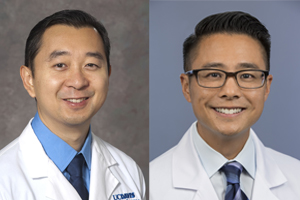
Medical educators have a formidable task when it comes to teaching the fundamentals of clinical neurology, as learners often perceive neurology as one of the most difficult disciplines when it comes to making a differential diagnosis, conducting examinations, and interpreting imaging results. So how do educators teach this complex clinical specialty to learners across multiple disciplines in a uniform, reliable fashion? That's the question Kwan Ng, M.D., Ph.D, and Alan Yee, D.O., set out to answer when developing the Precision Interprofessional Neurologic Educational Learning (PINECLE) program.
In collaboration with the Office of Continuing Medical Education, Dr. Ng and Dr. Yee developed a program that combines teaching at a patient's bedside, simulation education, and online educational videos and modules to teach learners how to conduct a neurological examination, with a particular focus on stroke patients. The program is aimed at improving outcomes for stroke patients by standardizing the approach for recognizing and treating such patients, ultimately creating a consistent process for all practitioners no matter where they are in the health care system. In addition to the Office of Continuing Medical Education, other course collaborators include Dr. Lara Zimmermann, Dr. Ryan Martin, Kellie Brendle, R.N. (PDF) and Dr. Ian Julie.
Online modules are available to UC Davis Health employees via the UC Learning Center.
CME Partners with Individualized Physician EHR Training Program to Improve Patient Care
The Physician Efficiency Program (PEP), which helps UC Davis Health physicians better manage their work in the electronic health record (EHR), avoid burnout, and improve patient care, has partnered with the Office of Continuing Medical Education to offer a course that is certified for CME credit. During the course, each physician receives up to four hours of individualized, one-on-one training in the EHR.
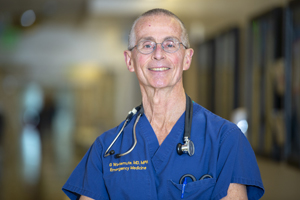
Garen Wintemute, M.D., M.P.H, is a pioneer in the field of injury epidemiology and the prevention of firearm violence. As an emergency medicine physician, professor and director of the UC Davis Violence Prevention Research Program, Wintemute has studied gun violence for more than 30 years and approaches the subject as an issue of public health.
In collaboration with the Office of Continuing Medical Education, Wintemute and his colleagues launched a new course in February 2019 called Preventing Firearm-Related Injury and Death: A Targeted Intervention. The complimentary online, on-demand CME course was designed for any health care provider interested in clinical strategies for preventing firearm-related injury and death.
Q&A With Dr. Garen Wintemute
Q: What makes this course unique?
A: Many health care providers believe that firearm injury prevention is within their responsibilities, but few medical schools or training programs include training on prevention of firearm-related harm in their curricula. This course helps fill this void. The course accompanies a detailed online resource for health care providers that we’ve developed to support them in learning more about the problem and how they can help reduce firearm-related harm.
Q: What are the goals of this educational program?
A: This course aims to introduce health care providers to firearm injury and death as a public health problem and to detail their role in prevention of everyday types of firearm-related harm, such as suicide, homicide, and unintentional injury and death. By understanding who is sustaining firearm-related harm and by what means, providers can implement a specific, targeted intervention involving asking about access to firearms and counseling on safe firearm practices when clinically relevant.
Q: If there's one takeaway you want people to have from this course, what is it?
A: The key takeaway is that health care providers have a unique ability to intervene to prevent firearm-related harm among the patients with whom they interact every day. They can ask, and, given risk, they can intervene.
